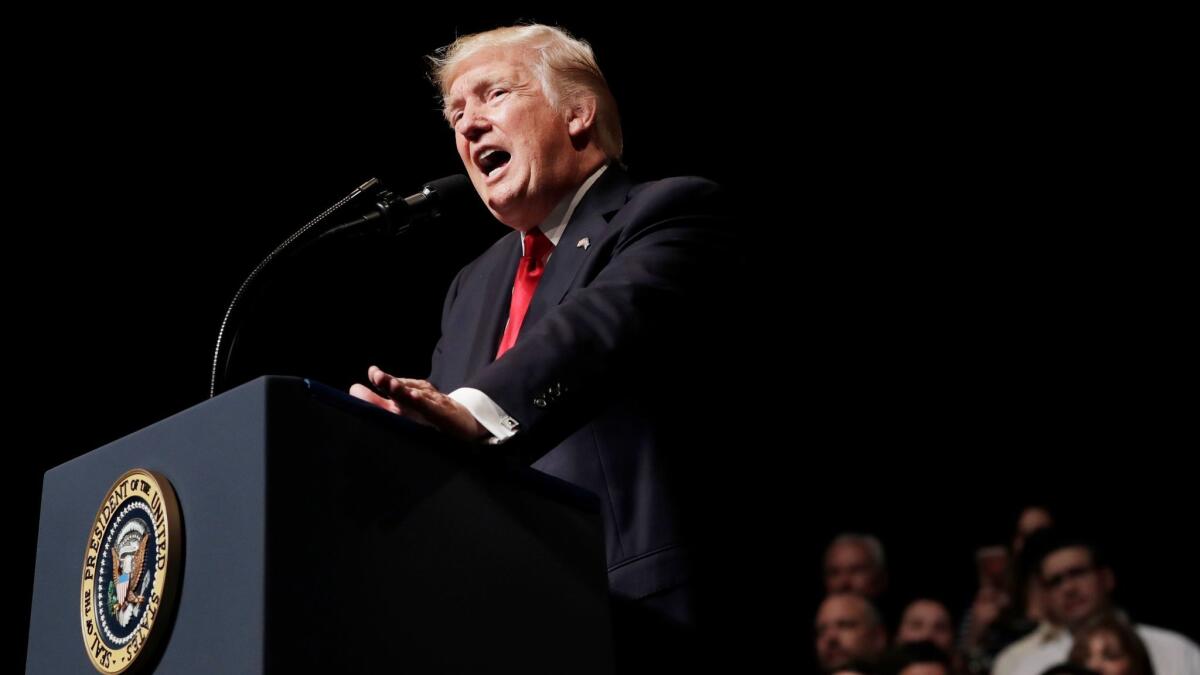Editorial: Trump just reopened the Cold War with Cuba. His excuse was completely disingenuous

- Share via
The United States isolated Cuba diplomatically and economically for half a century in an effort to force Fidel Castro out of power, or at least to change his repressive ways. But the freeze-out — a misguided Cold War policy the U.S. clung to for far too many years — didn’t work. In fact, the White House sanctions, along with a separate congressionally mandated embargo, made life more miserable for the Cuban people rather than better, while failing to dislodge Castro, who outlasted nine U.S. presidents before retiring.
Finally, in 2014, President Obama acknowledged reality and began normalizing diplomatic relations. He opted for engagement, rather than estrangement, to persuade Fidel’s successor (and brother), Raul Castro, to loosen domestic restrictions on speech, political activity and other human rights. But now, just as that policy was getting underway, President Trump, who seems to view every Obama policy as a personal affront, wants to return some chill to the relationship. In Miami on Friday, he announced that he would once again bar American tourists from traveling on their own to Cuba and ban business transactions with firms connected with Cuba’s military and security services, which covers a large part of the island nation’s economy.
That’s bad policy for Americans as well as Cubans, and it’s based on a disingenuous argument. The putative reason for the change is that Cuba still violates the human rights of its own people, including jailing dissidents and independent journalists. But hasn’t the Trump administration been moving the U.S. away from its focus on human rights around the world? Pressing foreign governments to end oppression has been a mainstay of U.S. foreign policy for decades under Republican and Democratic administrations — but Secretary of State Rex Tillerson told State Department employees last month that the U.S. would no longer put such a premium on human rights issues because such considerations could interfere with our national interests. Trump has vowed to put “America first” and has been loathe to criticize foreign leaders publicly for their violations of human rights.
Trump decides to draw a line at Cuba’s human rights policies? He could at least try to make a fake excuse a little more believable.
Consistent with that amoral approach, human rights wasn’t on the agenda when Chinese President Xi Jinping, whose regime has engaged in a years-long crackdown on dissidents, visited President Trump at Mar-a-Lago two months ago. The subject went unaddressed when Egypt’s authoritarian president, Abdel Fattah Sisi, visited the White House earlier in April. Sisi’s government, which receives $1.3 billion a year in military aid from the U.S, is accused of killing, jailing or torturing thousands of dissidents. Trump has also praised President Rodrigo Duterte for doing an “unbelievable job on the drug problem” in the Philippines — a campaign that has involved, according to human rights monitors, the extrajudicial executions by police and vigilantes of more than 7,000 suspected addicts and dealers.
Now Trump decides to draw a line at Cuba’s human rights policies? He could at least try to make a fake excuse a little more believable.
What’s really happening is that Trump has let the anti-Castro sect in Congress take the wheel on this issue, no doubt for cynical political reasons. Remember that Trump broke with his Republican rivals during the campaign and supported Obama’s rapprochement with Cuba. Then he flipped and disparaged the policy as a bad deal, and pledged to undo it unless Cuba met fresh demands on human rights, including the “freeing of political prisoners.”
Cuba certainly needs to do much more to respect human rights. Under Fidel and Raul Castro, dissidents have been jailed and political freedom has been restricted. But the U.S. maintains normal relations with many countries that have weak records on human rights; cutting ties and slapping on sanctions and restrictions that hurt ordinary Cubans is not the best way to change things, as the U.S. learned long ago.
We gain by connecting with other nations, not by pushing them away. Whether Trump likes it or not, we live in a globalized economy and in a world where discussion and diplomacy provide the best avenues for resolving differences. Instead of cutting back on connections with Cuba, Trump should expand them, and lean on Congress to lift its punitive embargo as well, while also pressing the country on its human rights record.
Trump has said he wants to help the Cuban people “begin their journey toward prosperity and liberty.” He can’t do that, though, by reverting to the ineffective policies that caused so much pain for so many years. A better outcome, for the U.S. and Cuba, would be reached through normalized relations, diplomacy and the exercise of soft power.
Follow the Opinion section on Twitter @latimesopinion or Facebook
MORE FROM OPINION
Like many of my rookie legal clients, Jeff Sessions can’t bring himself to shut up
Is Trump mentally fit to be president? Let’s consult the U.S. Army’s field manual on leadership
Trump is dropping out of the Paris agreement, but the rest of us don’t have to
More to Read
A cure for the common opinion
Get thought-provoking perspectives with our weekly newsletter.
You may occasionally receive promotional content from the Los Angeles Times.






